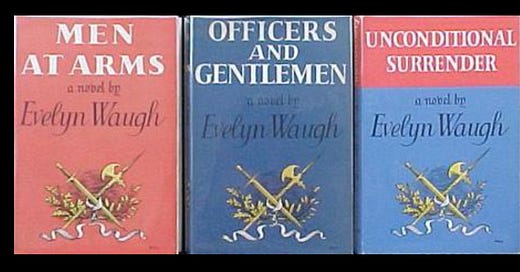Quick Take: The Best WW2 Memoir Actually is a Novel
Eighty years ago, Evelyn Waugh was the saddest man ever to survive WW2, and it shows in his "Sword of Honour" trilogy
Most British writers who spent World War II in uniform contributed to the military effort as translators, assistants and publicists. When the famous Evelyn Waugh tried to enlist for the front lines at the age of thirty-six, with no military experience and a poor attitude, he had to use a lot of contacts to end up in a commando unit where his twenty-something colleagues treated him and others of a certain age like cranky old men.
It’s no wonder that Waugh's military experience was so shocking, valuable, and absurd at the same time that it inspired him to write the best series of wartime novels: a trilogy called "The Sword of Honour," a quasi-memoir in which he recounts his own adventures in a fictionalized and merciless way. Waugh’s WW2 is unlike anything you ever saw before.
As he explains in the first volume’s opening pages, the (converted) Catholic Waugh saw in Nazism a denial of his Christian humanist values, and in the army the possibility of redeeming and giving meaning to a life dominated by leisure and inner doubts about a literary prestige he gained by publishing humorous novels that became synonymous with the Roaring Twenties. Such a fool was he.
That’s not my judgment. That’s his. Late in the trilogy, Waugh has his alter ego — “Guy Crouchback” — talk to a Jewish refugee, madame Kanyi, in Croatia of all places (because Guy’s fictional adventures, mirroring Waugh’s real-life ones pretty closely, are wide-ranging in scope). Kanyi addresses Guy thus:
‘Is there any place that is free from evil? It is too simple to say that only the Nazis wanted war. These communists wanted it too. It was the only way in which they could come to power. Many of my people wanted it, to be revenged on the Germans, to hasten the creation of the national state. It seems to me there was a will to war, a death wish, everywhere. Even good men thought their private honour would be satisfied by war. They could assert their manhood by killing and being killed. They would accept hardships in recompense for having been selfish and lazy. Danger justified privilege. I knew Italians – not very many perhaps – who felt this. Were there none in England?’
‘God forgive me,’ said Guy. ‘I was one of them.’
The Sword of Honour is many things. First of all, it’s Waugh’s best novel, with all the virtues he displays in “Brideshead Revisited” in full exhibition, and a much more complex story with more characters and locations. That’s enough to make the book the best about World War II.
This may sound like a risky thing to say. I just ask the reader: name me a better book about WWII. A book that is better written, that has more truth to it, that shows more theaters of action, that deals with more human foolishness and reflects on the entire war more deeply than this trilogy. I don’t think you will find that book.
A summary of the plot will help me explain what I mean.
Keep reading with a 7-day free trial
Subscribe to A History of Mankind to keep reading this post and get 7 days of free access to the full post archives.




